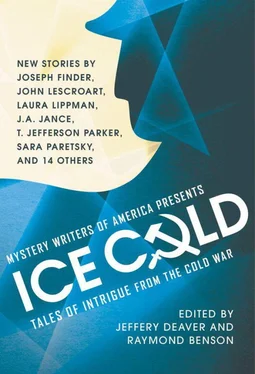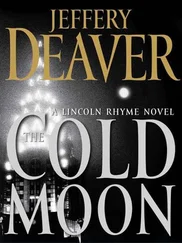Stephens was staring through his porthole. “There it is,” he said.
“Yeah,” Michaels said, “we know.”
He sounded bored. There was no role for a copilot on Alvin , and there was no pilot born who enjoyed being a spare tire.
“How long till your boat shows up?” Michaels asked Stephens, “I want to get the hell out—”
He never finished the sentence. His words turned into a harsh cry of terror and pain.
Harbison couldn’t turn around. Not immediately. First he had to shut off the thrusters, or else risk running Alvin into a rock wall.
But he didn’t need to look. He knew what had just happened.
When had Harbison figured it out?
That was easy: The first time he and Stephens been together, heading down to retrieve the hydrogen bomb that had been lost off Palomares.
The seas had been rougher than usual, and the bomb, located a little more than half a mile down, was not deep enough to avoid tidal surges and strong currents.
Stephens had gotten seasick.
In the tiny cabin, this was never pleasant, either for the man suffering or for his trapped companions. The smell alone could make seasickness contagious, if you were a greenhorn.
But Harbison had seen—and smelled—it all by now. It happened often enough when scientists came down on their first descent. He didn’t particularly enjoy the experience, but he was used to it.
After twenty minutes of explosive vomiting into the sick bags Alvin always carried in abundance, Stephens fell into a doze that was more like semiconsciousness. This was typical, too, and Harbison, feeling a little sorry for the old man, let him rest as they descended. He wasn’t needed yet.
During both descent and ascent, Alvin ’s journey was almost entirely silent. It used no engine in either direction. Weighted with steel ballast, it fell through the water like a stone. After its mission was complete, it dumped the ballast and popped back to the surface like a slow-motion cork.
Its only engines were the thrusters, designed for short-term maneuvering and keeping the sub in position.
After a few minutes of silence broken only by the musical sound of the water buffeting the submersible as it fell, Stephens started muttering. At first it sounded just like nonsense, random syllables, and Harbison paid it no mind.
Then the old man’s voice rose and he spoke more clearly. Harbison felt himself grow still, and inside his chest his heart thumped. He still couldn’t understand the words, but he had no problem figuring out what language the old man was using.
No adult living and working anywhere around the United States military could fail to recognize Russian when he heard it. Especially when it was coming from the mouth of a man who was about to be in close proximity to a hydrogen bomb.
A few moments later, Stephens came back to awareness. Harbison watched as his eyes went from hazy to sharp, and only looked away as the old man fixed him with a sudden, sharp stare.
But neither of them said a word. Soon afterward they got busy recovering the bomb, and it was as if the incident, the revelation, had never happened.
Except it had.
By the time Harbison was able to shut off the thrusters and turn away from his porthole, Michaels was lying on the floor. In the tight space, his kicking legs collided with the seats and thudded against the metal walls. His pale, red-rimmed eyes were glassy, and spit was flowing from his stretched-wide mouth. He was gasping loudly, the sounds echoing off the metal walls.
Stephens had a gun in his right hand, something silver, with a long barrel.
“Great idea,” Harbison said, “using one of those in a pressurized cabin a mile down.”
Stephens smiled and shrugged. “These darts won’t penetrate the walls.”
Now Harbison saw the metal shaft emerging from Michaels’s neck. The spasms coursing through the dying man’s body had diminished to deep shivers.
“That wasn’t the plan,” Harbison said.
Stephens shrugged. “He was too noisy.”
“And me?”
Stephens raised the weapon. Harbison could see the tip of the arrow resting in the barrel.
Then the old man let his arm fall. “You I trust,” he said. “Enough.”
He sat down on his stool and placed the gun on the floor beside his foot. “Fire up those thrusters again,” he said, “and I’ll tell you what we do next.”
Harbison took another few seconds, then turned back to the instrument panel.
Alvin rose from the rock face and moved forward.
Harbison had spent months after returning from Spain asking questions, making inquiries, calling in favors. Never saying exactly what it was he was looking for, or why, but learning all he needed to know by the end. Doing what he did for a living, he’d met a lot of people who could answer his questions.
Finally he knew enough to pay a visit to Christopher Stephens.
The headquarters and laboratories of Vision Industries, the company that built the CARV, were located in a corporate park near the New Jersey Turnpike. Just another set of long, low buildings made of yellow-gray stone and glass, with the future being created inside.
You never knew what was going on inside those anonymous buildings. Or wanted to know, if you were most people.
When he walked in the door of the corner office, its windows overlooking a pond with geese floating in it, the old man looked up at him but did not bother to stand.
“I heard you’ve been sniffing around,” he said. His voice was deep and gravelly, his eyes cold behind the fleshy ridges that bracketed them. “Now I’m guessing you’ve come to threaten me.”
Harbison glanced around. “Anyone listening in on us?”
“Of course not.” Stephens steepled his fingers. “So talk.”
Harbison talked. He told about what he’d overheard when Stephens had gotten sick onboard Alvin , what he’d suspected, what he’d learned since coming back home. What he believed Stephens’s ultimate plans were.
As he listened, Stephens relaxed, tension leaving the line of his jaw and the furrowed skin above his cheekbones. “Ah,” he said at last. “I see. Not threats. Blackmail.”
“No,” Harbison said. “Teamwork.”
At last the old man seemed surprised. His gaze grew cold again. “You want to… work with me?” he said cautiously.
“Yes.”
“Why should I believe that?”
“Because if I didn’t want something, I would just have turned you in.”
Stephens shrugged, though his expression was angry. “I’m not afraid of that. I’m… well protected.”
“Maybe you are. But it would be a terrific pain in your ass, wouldn’t it?” Harbison drew in a breath. “You’re right. I’m here because I want something in return. But it’s not money.”
“What, then?”
Harbison didn’t answer directly. “If something like Palomares happens again—”
“Oh, it will.” The old man’s eyes gleamed. “There’s always a next time.”
“Bring me in on it.”
For a long moment Stephens stared up into his face. “If it’s not for money,” he asked again, “then why?”
Harbison didn’t reply.
Stephens straightened in his chair. “For me to believe you, you must tell me.”
Still Harbison hesitated. Then, at last, voice harsh, breath short, he began to speak.
Telling the story he’d never told to anyone before.
In Palomares, the only bomb Harbison had cared about was the one that had fallen into the water, the one he waited weeks to retrieve.
The three that hit land didn’t concern him.
It was only later that he heard what had happened to them. None had been fully armed, meaning they couldn’t explode with five times the power of the bombs that had flattened Hiroshima and Nagasaki just twenty-one years earlier. The bombs that had started the arms race and the Cold War.
Читать дальше












